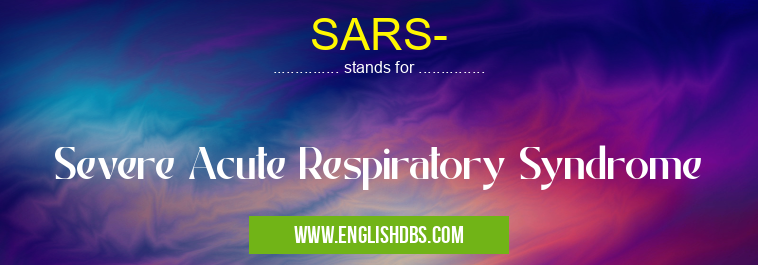What does SARS- mean in SYNDROMES
SARS- stands for Severe Acute Respiratory Syndrome. It is a viral respiratory illness caused by a coronavirus called SARS-CoV. The virus was first identified in 2002 during an outbreak in southern China. SARS-CoV causes a range of symptoms, including:

SARS- meaning in Syndromes in Medical
SARS- mostly used in an acronym Syndromes in Category Medical that means Severe Acute Respiratory Syndrome
Shorthand: SARS-,
Full Form: Severe Acute Respiratory Syndrome
For more information of "Severe Acute Respiratory Syndrome", see the section below.
- Fever
- Cough
- Shortness of breath
- Difficulty breathing
- Pneumonia
- Respiratory failure
Symptoms of SARS-
The symptoms of SARS- can range from mild to severe. In some cases, the virus can be fatal. The most common symptoms of SARS- include:
- Fever: A fever is a body temperature that is higher than normal.
- Cough: A cough is a reflex that helps to clear the throat and lungs of mucus.
- Shortness of breath: Shortness of breath is a feeling of not being able to get enough air.
- Difficulty breathing: Difficulty breathing is a serious symptom that can be a sign of respiratory failure.
- Pneumonia: Pneumonia is an infection of the lungs.
- Respiratory failure: Respiratory failure is a condition in which the lungs are unable to function properly.
Transmission of SARS-
SARS- is spread through close contact with an infected person. The virus can be transmitted through droplets that are produced when an infected person coughs or sneezes. The virus can also be spread through contact with contaminated surfaces or objects.
Treatment of SARS-
There is no specific treatment for SARS-. Treatment is supportive and includes:
- Rest
- Fluids
- Oxygen therapy
- Antiviral medications
- Antibiotics
Prevention of SARS-
There is no vaccine to prevent SARS-. The best way to prevent SARS- is to avoid contact with infected people and to practice good hygiene. Good hygiene practices include:
- Washing your hands frequently with soap and water
- Covering your mouth and nose when you cough or sneeze
- Avoiding touching your eyes, nose, and mouth
- Staying home from work or school if you are sick
Essential Questions and Answers on Severe Acute Respiratory Syndrome in "MEDICAL»SYNDROMES"
What is SARS?
SARS (Severe Acute Respiratory Syndrome) is a viral respiratory illness caused by a coronavirus called SARS-CoV. It is characterized by fever, cough, shortness of breath, and difficulty breathing. SARS was first identified in China in 2002 and quickly spread to over 30 countries, infecting more than 8,000 people and killing over 700.
How does SARS spread?
SARS spreads through close contact with an infected person, typically through respiratory droplets produced when they cough or sneeze. It can also be spread through contact with contaminated surfaces or objects.
What are the symptoms of SARS?
Symptoms of SARS typically appear within 2-7 days after exposure to the virus and include:
- Fever
- Cough
- Shortness of breath
- Difficulty breathing
- Fatigue
- Muscle aches
- Headaches
- Confusion
How is SARS diagnosed?
SARS is diagnosed based on the symptoms, a physical examination, and a laboratory test to detect the virus in respiratory secretions.
What is the treatment for SARS?
There is no specific treatment for SARS. Treatment is supportive and may include:
- Rest
- Fluids
- Oxygen therapy
- Antiviral medications
- Antibiotics (if a bacterial infection develops)
Is there a vaccine for SARS?
No, there is currently no vaccine for SARS. However, researchers are working on developing one.
How can I prevent SARS?
There are no specific measures to prevent SARS, but general hygiene practices can help reduce the risk of infection, including:
- Washing hands frequently
- Avoiding close contact with people who are sick
- Covering your mouth and nose when coughing or sneezing
- Disinfecting frequently touched surfaces
Final Words: SARS- is a serious respiratory illness that can be fatal. The virus is spread through close contact with an infected person. There is no specific treatment for SARS-, but treatment is supportive and includes rest, fluids, oxygen therapy, antiviral medications, and antibiotics. The best way to prevent SARS- is to avoid contact with infected people and to practice good hygiene.
